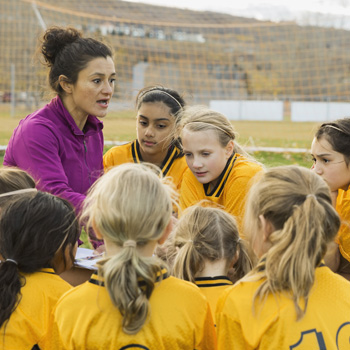
Do you live for the game? Whether you were a three-letter varsity athlete in high school, never miss your weekend rec league match, or just enjoy cheering from the sidelines, there are numerous career options that can help you turn your passion for athletics into a fulfilling career. One of those is the role of sports psychologist.
Wondering how to become a sports psychologist? To launch your career, you will need to determine if the field is the right fit for you, fulfill the educational requirements, and obtain state licensure.
Contents
What is Sports Psychology?

Though a passion for athletics is a great place to start, sports psychology is about much more than simply telling a batter to keep his or her eye on the ball. In this role, you will deal with many of the clinical issues that a traditional psychologist or therapist would deal with, but in an athletic capacity, says Sarah Castillo, lead faculty for National University’s Bachelor of Arts in Sport Psychology program and the co-director of the Center for Performance Psychology.
“That can include things like eating disorders, depression, and behavioral disorders,” Castillo adds.
According to the American Psychological Association, sports and performance psychologists play a vital role in helping players — or even entire teams — achieve their full potential through interventions related to communication skills, thought patterns, personal relationships, coping strategies, and more. While this often takes place behind the scenes, it can also include on-the-field interventions.
While many aspiring sports psychologists dream of working with Olympians or professional athletes, these are far from the only people that use sports psychology services. Other clients can include student-athletes of all levels, coaches, and even members of the military. Castillo reports that the U.S. Army is a leading employer of professional sports psychologists with professionals employed at military bases both in the country and overseas.
According to the Bureau of Labor Statistics, demand for psychologists in general — which includes sports psychologists — is expected to grow by 14 percent between 2016 and 2026, adding 23,000 jobs to the market.
How to Become a Sports Psychologist
Think sports psychology is right for you? To launch your career, you will need to complete the following steps:
- Earn an undergraduate degree in psychology or a related field
Your first step in completing the academic requirements is to pursue a bachelor’s degree. While it does not necessarily need to be in sports psychology, the foundation of an undergraduate degree in the specific field can be helpful. In programs such as National University’s Bachelor of Arts in Sports Psychology, you will explore how psychological factors influence sports performance, and acquire techniques to increase this performance, while reducing anxiety. - Complete a graduate degree
When it comes to how to become a sports psychologist, a bachelor’s alone is not enough — a graduate degree is required for licensure. While a Ph.D. is necessary for some positions, you can qualify for others with a master’s. The positions you are interested in will help you determine which option is the best choice for your career. - Gain professional experience
To prepare for your role in sports psychology, you should look for opportunities to gain hands-on experience to help develop your skill set. The most traditional option is to complete an internship in tandem with your undergraduate or graduate program. - Obtain board certification
Once you have completed your degrees, you will need to satisfy licensure requirements before you can begin your new role.

“Even with an academic degree in sports psychology, you still have to be a licensed psychologist in the state in which you’re working in order to call yourself a sports psychologist,” Castillo says.
Interested in the field, but not sure that the role of a licensed sports psychologist is right for you? There are many other jobs in sports psychology, many of which do not require a graduate degree, such as performance enhancement trainer. Castillo said that other National University graduates have used their degree to pursue an athletic coaching career, expand the services they offer at their gym, or design performance programs as a corporate consultant.
Pursue Your Sports Psychology Career with National University
When it comes to figuring out how to become a sports psychologist, you do not need to go it alone. Consider enrolling in National University’s Bachelor of Arts in Sports Psychology program. From day one, you will be guided and encouraged by our highly trained faculty and support staff, whether you choose to pursue your degree on our campus, or through our online learning option.
“There are only nine undergraduate sports psychology programs in the entire country,” Castillo says. “Of those, National has the only one that can be completed entirely online.” Want to learn more about how you can pursue a career in sports psychology with the support of National University? Request information online here or contact us at soe@nu.edu.